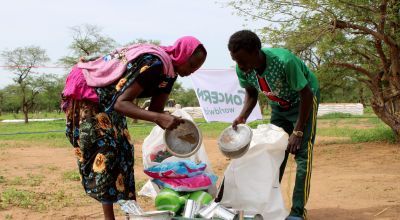
Read our 2023 annual report

Knowledge Hub
“My childhood was good compared to now. Now, life is harder. In the past, there was freedom of movement for our parents. They would even go to the Nigeria side of the lake in search of fish. Now, because of insecurity, we cannot do that anymore.”
As Lake Chad glistens in the early evening light, Aicha gathers fish, browned and leathered, from a brick smoke house. She is a mother of seven, and the President of the Fishing Association in her small village, in Lac province, western Chad.

Here, they fish. But in recent years, the twin threats of conflict and climate change have conspired to endanger a way of life. There is less fish in the lake, and less customers waiting on shore – the violence of Non-State Armed Actors, once confined to northeastern Nigeria, has spread throughout the Lake Chad region. In Lac province, markets are looted, and people are afraid to travel.
Working alongside Aicha is Mahamat, Vice President of the Fishing Association; “Before we used to live calmly, as we had peace. We did not have any issues. Right now, we live in fear because conflict can come at any time.
“When armed men came here three years ago, they kidnapped some of our people. They took four people from our village. We lost them, and we have never seen them again. These people left wives and children.”
In February 2024, the Government of Chad declared a ‘food and nutrition emergency’ in Chad. Approximately 3.4 million people are expected to face severe food insecurity from June to August, the lean season between harvests.

Concern Worldwide, in partnership with Irish Aid, is supporting the people of this village to endure climate change and insecurity, and sustain their way of life.
Diminishing fish stocks in Lake Chad had forced the local fishermen to travel further and further from home, venturing into dangerous waters where non-state militants are active. The community have since become more economical, maximising the benefits of the fish available closer to home.
The first step was to form the Fishing Association. Aicha explains; “Concern came here and asked us to form an association for fishing. We have 26 members – 14 woman and 12 men. My village elected me as their President. I am so proud. Now, I believe that I have leadership qualities, because otherwise they would not have selected me to be their President.”
The group were provided with training in governance – the structure, financial controls, and rules of order required to run an Association which would benefit all members equally, and transparently.
Mahamat, the Vice President, explains how the Association functions: “The men are the ones who go out to catch the fish, and the women are the ones who go to the market to sell the fish. Once we sell the fish, we divide the money. Some of the money goes into our savings fund, and then we divide the rest amongst the members.”
From the pooled savings fund, Association members can access small loans to help with emergency costs or to start small businesses.
The Association also received improved fishing nets, and the fishermen began to enjoy greater hauls. “I am happy that now we catch a lot of fish,” says Aicha, “and we can give fish to our Association members at a cheap price, and they can then go and sell in the market for a profit.”
Not only are the Association members selling more fish, they are also selling a greater variety of fish products. Concern constructed a smoke house and a dryer – a raised steel mesh on which fish dries in the baking sun. Once ashore, the fish is now either dried or smoked. The smoked fish keeps for longer and can be sold at any time in the year. The community now sell fresh fish, dried fish, and smoked fish - a diversification of their income.


“Now we have more money,” says Aicha. “We use some of it to pay school fees for our children. Four of my children are in school but the others are not. I used to have three children in school but this year I was able to add one more to make it four. We are also eating better now compared to the past. Now we eat three times in a day. Now we even change the type of food to eat when we want to. That was not possible in the past. We have a variety like rice, maize, as well as fish.
“Now we have the hope that we can grow bigger."
All names have been changed.





